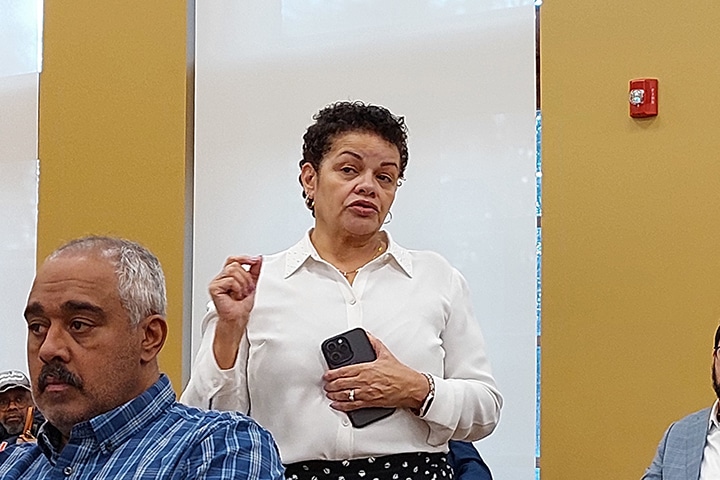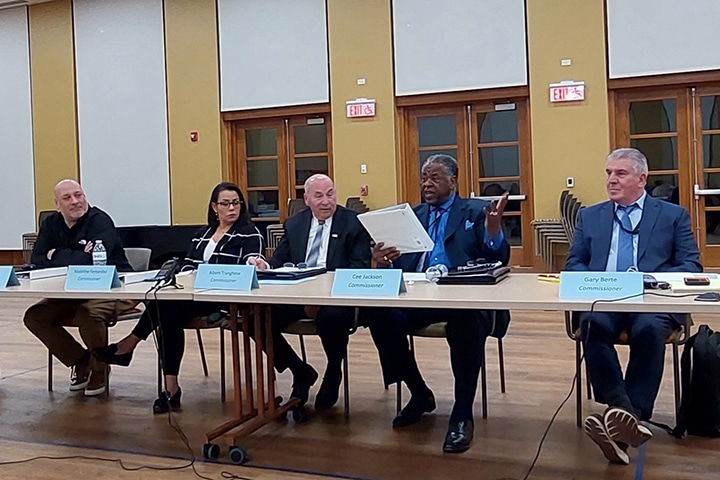Commissioner Cee Jackson addresses residents at the Board of Police Commissioners annual meeting on March 13.
Reminder Publishing photo by Sarah Heinonen
SPRINGFIELD — The Springfield Board of Police Commissioners conducted its annual meeting to present the yearly report. It also publicly addressed questions by the community about how the board functions and the manual that determines what cases the commissioners review.
Commissioner Al Tranghese began the meeting by explaining that the role of the commissioners is to hear complaints, review all reports and documents and hear testimony from all sides. The commissioners follow a guideline that was created by the Department of Justice and the city’s law department.
“It’s about as fair as you’re ever going to be to officers and the residents of Springfield. We’re looking at it from the point of civilians, not police,” Tranghese said.
Tranghese referred to the board as “diverse” and representative of Springfield. It is composed of four men and one woman, with backgrounds as business owners, law enforcement officers and community activists.
The Board of Police Commissioners’ 2023 report breaks down data from the year regarding the number of complaints and the category in which they fell.

Reminder Publishing photo by Sarah Heinonen
Complaints against police officers are investigated by the department’s internal investigation unit. Devon Grierson, attorney for the Board of Commissioners, explained that “minor” offenses or infractions such as rudeness, uniform violations or being late to a shift, trigger what are known as “preliminary investigation of employees.” These infractions are generally punishable by five or fewer days of suspension without pay and are not referred to the Board of Police Commissioners.
In 2023, there were 27 recorded preliminary investigations of employees. Of those, three were found to be “sustained complaints,” in which the investigation produced “a preponderance of evidence” — a determination that truth of the allegation is more likely or probable — to prove the allegation of misconduct. These resulted in retraining or administrative discipline. Four were found to have not produced that level of evidence. The remaining 20 were determined to be unfounded.
“Special orders” complaints that rise to a higher level of seriousness such as use of force, harassment or officer involved shootings, Grierson said.
There were 35 special orders, which were referred to the commissioners. Of these complaints, 17 were sustained. Evidence to prove the complaint was not found in three cases, and another nine were unfounded. In one case, the complaint was “exonerated,” which the state defines as the actions being “legal, justified, proper and in conformance with the law and the agency policy and procedure.” A further five complaints are still under investigation.
Of the complaints reviewed by the commissioners, only five progressed to a disciplinary hearing. The discipline in those five cases ranged from suspension without pay to termination. Tranghese said commissioners have a rubric to help them decide the discipline on a case, but they can impose other disciplines, provided it can be justified. The Board of Commissioners decision is final within the city. However, individuals can appeal to those decisions to the state’s Civil Service Board. In turn, the Board of Police Commissioners can appeal the Civil Service Board’s decision to the state’s Peace Officers Training and Standards Commission.
Tranghese said that the 2-year-old Board of Commissioners is constantly working to improve the process. Public comments are being accepted on a manual, created with input from the Department of Justice, for the Internal Investigations Unit and the rules regarding what cases are referred to the Board of Police Commissioners.
Tranghese said the Springfield Board of Police Commissioners would be joining a national group of similar bodies, which will help develop best practices nationwide.
Residents at the meeting expressed frustration that complaints are first investigated by a unit within the Police Department and that all complaints, whether minor or serious, are not referred to the civilian board.
When it comes to use of force, Commissioner Gary Berte explained that as it stands, an internal use of force committee determines whether the force was appropriate before the issue goes to the internal investigation unit and then the commissioners. Commissioner Madeline Fernandez said that she is on the use of force committee but noted that at the one meeting they had, she was told there was no use of force cases to be reviewed. Tranghese said the five commissioners agreed that all use of force complaints should come before them.
People also expressed frustration that patterns of minor infractions are not visible to the commissioners when reviewing a case. An officer’s file is only available to the Board of Commissioners after a case has been reviewed, a finding made and a disciplinary hearing has been opened.
A resident asked why there were so many hurdles for the board to review conduct. Tranghese told him, “Those are the types of things we’re going to work on” with incoming Police Superintendent Larry Akers, who begins in the position on April 10.
“I want to be fair to our officers. We review cases where the officers did nothing wrong,” Commissioner Norm Roldan said, before acknowledging, “I know that we have bad apples.”
The widow and mother of a Springfield police officer read a statement in which she quoted her late husband as saying, “A bad cop makes the job harder. They steal our respect. Even one bad cop is too many.”
Another resident asked whether police officers make complaints about other officers’ behavior. Tranghese said, “I know what you’re getting at, officers policing other officers. That’s what we want.” Berte said that while it was not common, it does happen. “I just remember them because they were so severe,” he said.
One person told the commissioners that she and her sister have been continually harassed and bullied by an officer who lives across the street. Despite several complaints, she said she had been told there was no evidence of wrongdoing. The commissioners suggested she speak with them privately after the meeting.
When discussing where to find complaint forms, which includes the Police Department’s 130 Pearl St. headquarters, a resident asked, “Why would I trust the department I’m filing a complaint on?”
City Councilor Tracye Whitfield said the commission should have its own line item in the police budget. “I suggest we find out what is happening with our tax dollars,” she said. She added that she had not voted in favor of the city’s budget for two years.
Commissioner Cee Jackson told the frustrated residents attending the meeting, “A year ago, we were where you are. We hear exactly and we appreciate.”
Comments on the Internal Investigations Unit manual can be made at springfieldmapolice.com/policies. Information on how and where to file a complaint can be found at springfieldmapolice.com/internal-investigation-unit.



You must be logged in to post a comment.